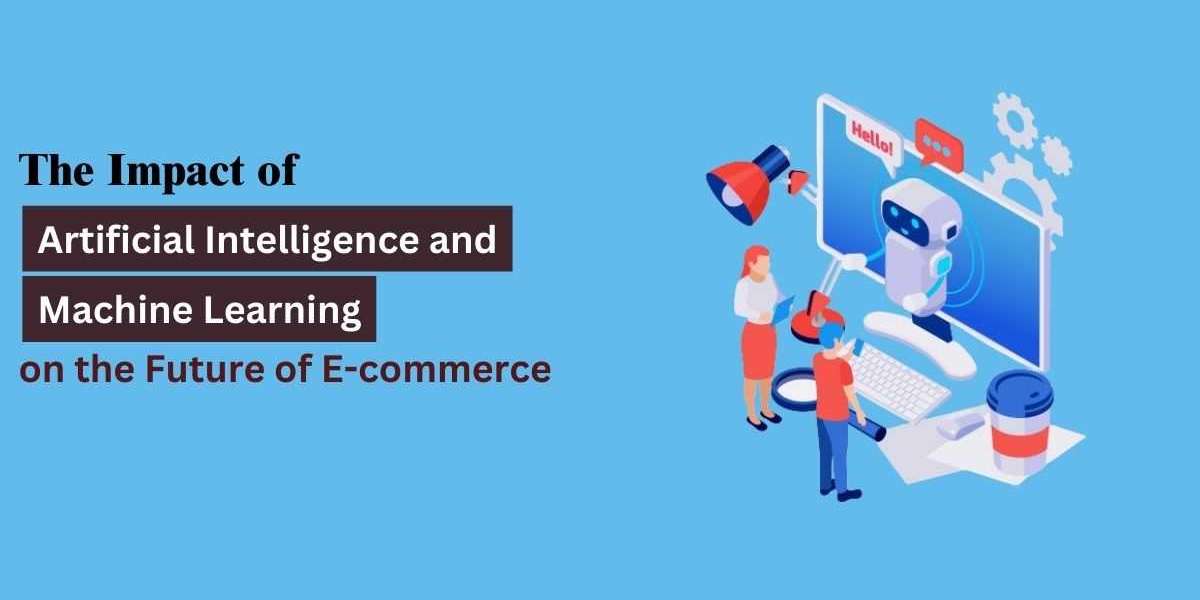The e-commerce landscape has been undergoing a dramatic transformation, driven largely by advancements in artificial intelligence (AI) and machine learning (ML). These technologies are not only reshaping the way businesses operate but also revolutionizing the customer experience. From personalized shopping to predictive analytics, AI and ML are setting new standards in the e-commerce industry. In this blog, we'll delve into the profound impact of AI and ML on the future of e-commerce and explore how businesses can leverage these technologies to stay ahead of the curve.
Personalized Shopping Experiences
One of the most significant impacts of AI and ML in e-commerce is the ability to provide personalized shopping experiences. By analyzing vast amounts of data, including browsing history, purchase patterns, and customer preferences, AI algorithms can create highly personalized recommendations for each user. This level of personalization enhances customer satisfaction and increases the likelihood of repeat purchases.
For instance, AI-driven recommendation engines, like those used by Amazon and Netflix, analyze user behavior to suggest products or content that align with individual tastes. These systems continuously learn and improve, ensuring that recommendations become more accurate over time. For businesses, this means higher conversion rates and increased customer loyalty.
Enhanced Customer Service with Chatbots and Virtual Assistants
AI-powered chatbots and virtual assistants are transforming customer service in e-commerce. These intelligent systems can handle a wide range of customer inquiries, from answering product questions to processing returns, all without human intervention. By providing instant, 24/7 support, chatbots enhance the customer experience and reduce the burden on human customer service representatives.
Moreover, advanced chatbots leverage natural language processing (NLP) to understand and respond to customer queries more accurately. They can also learn from past interactions to provide better support in the future. This level of efficiency and effectiveness improves customer satisfaction and reduces operational costs for e-commerce businesses.
Optimized Pricing Strategies
AI and ML are also revolutionizing pricing strategies in e-commerce. Dynamic pricing algorithms analyze market trends, competitor prices, and customer demand to set optimal prices for products. These algorithms can adjust prices in real-time, ensuring that businesses remain competitive while maximizing their profit margins.
For example, airlines and ride-sharing companies have long used dynamic pricing to adjust fares based on demand. Now, e-commerce businesses can adopt similar strategies to optimize their pricing models. By leveraging AI-driven pricing tools, businesses can attract more customers during high-demand periods and clear out inventory during low-demand times.
Improved Inventory Management
Effective inventory management is crucial for e-commerce success, and AI and ML are making it more efficient than ever. Predictive analytics powered by ML can forecast demand with high accuracy, helping businesses maintain optimal inventory levels. This reduces the risk of stockouts and overstock situations, which can both negatively impact sales and profitability.
AI systems can also automate the reordering process by monitoring inventory levels and predicting when items need to be restocked. This automation not only saves time but also ensures that popular products are always available, thereby enhancing the customer experience.
Advanced Fraud Detection and Prevention
Fraud is a significant concern in e-commerce, but AI and ML are proving to be powerful tools in combating it. ML algorithms can analyze transaction patterns and identify suspicious activities in real-time. By detecting anomalies that deviate from typical behavior, these systems can flag potentially fraudulent transactions before they are completed.
For example, AI can assess various factors such as transaction amount, location, and frequency to determine the likelihood of fraud. This proactive approach not only protects businesses from financial losses but also builds trust with customers by ensuring their data and transactions are secure.
Enhanced Search Functionality
AI and ML are significantly improving search functionality on e-commerce platforms. Traditional keyword-based searches often fail to deliver accurate results, especially when users make typographical errors or use complex queries. AI-driven search engines, however, use NLP to understand the intent behind a search query and deliver more relevant results.
Furthermore, image recognition technology powered by AI allows customers to search for products using images instead of text. For instance, a customer can upload a photo of a desired item, and the AI system will analyze the image and find similar products available on the platform. This visual search capability enhances the shopping experience and makes it easier for customers to find exactly what they are looking for.
Streamlined Supply Chain Management
AI and ML are also transforming supply chain management in e-commerce. By analyzing data from various sources, including suppliers, logistics providers, and market trends, AI systems can optimize the entire supply chain. This includes demand forecasting, inventory planning, and delivery scheduling.
For example, AI can predict potential supply chain disruptions and recommend alternative strategies to mitigate risks. This proactive approach ensures that e-commerce businesses can maintain a steady flow of products to meet customer demand, even in the face of unforeseen challenges.
Enhanced Marketing Strategies
Marketing in e-commerce is becoming increasingly data-driven, thanks to AI and ML. These technologies enable businesses to create highly targeted marketing campaigns by analyzing customer data and behavior. AI can segment customers into different groups based on their preferences, purchasing history, and demographics, allowing for more personalized and effective marketing efforts.
Moreover, AI-powered tools can automate various marketing tasks, such as email campaigns, social media posts, and ad placements. By leveraging machine learning algorithms, these tools can continuously optimize marketing strategies to achieve better results. For example, AI can determine the best time to send promotional emails or identify the most effective ad creatives to maximize engagement.
The Role of AI ML Development Companies
To fully harness the potential of AI and ML in e-commerce, businesses often turn to specialized AI ML development companies. These companies offer tailored AI ML development services that cater to the unique needs of e-commerce businesses. From developing custom recommendation engines to implementing advanced fraud detection systems, these services provide the technical expertise required to integrate AI and ML solutions seamlessly into existing e-commerce platforms.
Collaborating with an AI ML development company can help e-commerce businesses stay ahead of the competition by leveraging cutting-edge technologies. These partnerships enable businesses to focus on their core operations while benefiting from the latest advancements in AI and ML.
Conclusion
The future of e-commerce is undeniably intertwined with the advancements in AI and ML. These technologies are transforming every aspect of the industry, from personalized shopping experiences and enhanced customer service to optimized pricing strategies and advanced fraud detection. By leveraging AI and ML, e-commerce businesses can not only improve operational efficiency but also deliver exceptional customer experiences.
As the e-commerce landscape continues to evolve, businesses that embrace AI and ML will be better positioned to thrive in a highly competitive market. Whether through improved search functionality, streamlined supply chain management, or targeted marketing strategies, the potential of AI and ML in e-commerce is limitless. Partnering with an AI ML development company can further amplify these benefits, ensuring that businesses remain at the forefront of innovation and continue to meet the ever-changing demands of their customers.



